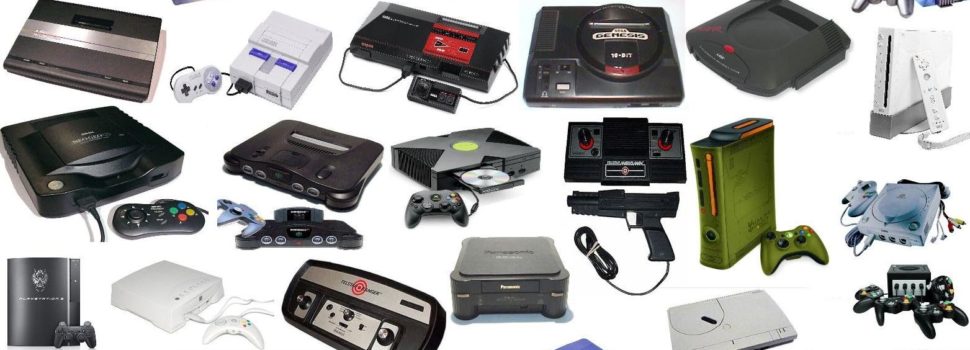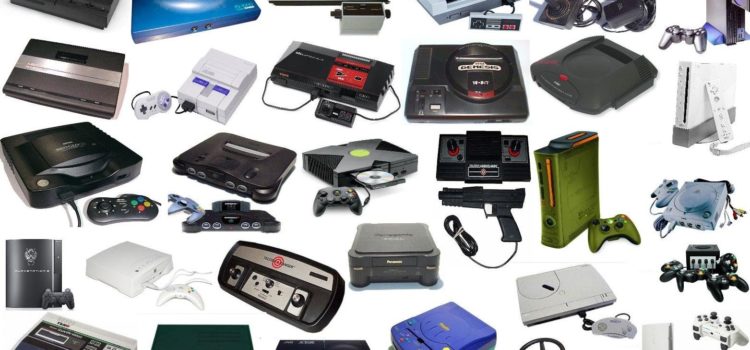


Today, instead of our usual Top Ten, we’re bringing you a Flop Ten! Everyone loves to look back at their favorite game consoles and remember the great times they had with them. However, it’s almost as fun to go back and poke fun at the worst consoles of all time. Today, we’re counting down the console flops that have defined their eras. From systems that failed despite being awesome, like the Dreamcast, to systems that were just plain awful, like the Virtual Boy, we’re counting them down. Let’s talk flops!
10. Dreamcast

Photo Credit: PC Authority
One of the saddest tales in gaming is of the crash of Sega. Sega was a bold company, unafraid to do literally whatever they thought would be cool. It was really their greatest strength: they had no fear! Going toe-to-toe with industry giant Nintendo was a no-brainer for the “no guts, no glory” company Sega. By the late nineties, though, after the failure of the Saturn and it’s many peripherals, Sega was in dire straits. So, their last hurrah was the release of the Dreamcast, an ostensibly excellent console that was doomed from the get-go. As console flops go, this one hurts.
Shenmue, Sonic Adventure and Crazy Taxi were some of the best releases at the turn of the century. However, Sega’s name didn’t inspire confidence in gamers, and Sony’s PS2 was on the horizon. Many gamers saw Sony as the new Sega, and as they believed it, so it was. The Dreamcast was to be Sega’s last home console, and the company transitioned to a third-party developer. Those who remember the Sega of 90’s still miss the bold, risk-taking Sega of that era, though.
9. Phillips CD-I

Photo Credit: Wikipedia
You might not have heard of the CD-I, but you’ve certainly heard of the terrible Legend of Zelda games released on it. Yeah, those, with the voice acting and hand-drawn animations. The CD-I was meant to be the step between home CD player and home computer. It was effectively a giant, glorified disk drive. And it was super weird, even at the time. It was released in 1991 for $700. If that sounds like it was a lot of money, go ahead and account for thirty years of inflation. Needless to say, Phillips didn’t make the mistake of entering the console wars again. While many console flops are due to marketing, this one was a more holistic “meh” reaction by the industry as a whole.
8. N-Gage

Photo Credit: YouTube
What a positively ridiculous idea, said everyone in 2003 as Nokia released this console/phone hybrid. Nokia’s idea with the Taco Phone was that gamers carried both cell phones and GameBoys. Why not combine these two pieces of technology into a freaking taco? Jokes aside, this thing bombed. No one wanted to play games with phone buttons, and no one wanted to talk into a taco-shaped gaming console. Nokia managed to fail to make the system appealing to any markets at all. A week after release, the system saw a $100 discount, but to no avail.
A year later, Nokia released a redesign called the N-Gage QD that was meant to address the problems of the first model. However, no one even took notice and the gaming community at large saw the platform as little more than a joke. Meanwhile, the GameBoy outsold the N-Gage literally 100-to-1. The moral of this story, and one that you’ll see later in this list, is “don’t mess with Nintendo’s handheld market.” Handheld console flops are a dime a dozen, and N-Gage is the poster boy of them.
7. Neo Geo CD

Photo Credit: Giant Bomb
The 90’s, affectionately remembered as the “Disposable Era,” saw the birth of many absolutely terrible gaming consoles. One notable example is the final home console released by SNK, the Neo Geo CD. Between its small game library and long loading time, the Neo Geo wasn’t poised to tackle any of the consoles of the mid-90’s. It was released in 1995 in North America but had been available in Europe and Japan the year before. By the time it hit American stores, though, it had to compete with the more powerful PlayStation and N64. Seeing as how you’ve heard of PlayStation and Nintendo, you can probably guess how things ended for SNK.
For what it’s worth, the Neo Geo X handheld did eventually resurrect the once-dead console line. That handheld also went the way of its predecessors, though, tanking nearly a year after release. It’s tough to be SNK, it seems.
6. Atari Jaguar

Photo Credit: Leftover Culture Review
Atari struggled to find its footing again after the Video Game Crash in the mid-80’s. Nothing exemplifies that better than the botched Atari Jaguar. The system was actually much more powerful than the SNES and Genesis systems, but the games released for it were mostly garbage. A ton of rushed shovel-ware and underdeveloped games brought the system down. It was to be Atari’s final entry in the home console market. While the company plans to release a throwback console next year, their once-great name is now synonymous with an era of forgettable, poorly-made games.
5. Atari Lynx

Photo Credit: Atari Age
Remember when I said you really shouldn’t try to fight Nintendo on the handheld market? I meant it. Atari learned that lesson the hard way with the ill-fated Atari Lynx in 1989. The system was certainly more powerful than the GameBoy. It had a full-color screen, it sported more buttons and a much sleeker design. But it didn’t have Tetris, or Mario. And, as such, it was doomed to fail. While the system would go on to sell around 3 million units, the GameBoy sold 16 million units in 1991 alone. By 1996, Atari was on its last legs thanks to the failure of the Lynx and Jaguar. Atari sold out to Hasbro that year, thus signaling the end of an era.
4. 3DO Interactive Multiplayer

SONY DSC
Photo Credit: Wikipedia
The 3DO, released in 1993, is an example of how poor marketing and pricing can kill an otherwise great system. Despite a strong library of games and good multimedia applications, the 3DO stumbled after the release of the Sega Saturn and PlayStation. The exorbitant price point, $700, didn’t drop until the system was already dead in the water. If the system had been priced more aggressively it could have sold better, but the company was stubborn. The rest is history; have you ever even heard of 3DO? Other companies could learn from their mistakes.
3. Virtual Boy

Photo Credit: Console Variations
This eye-strain inducing virtual reality console was Nintendo’s first big console flop, but it wouldn’t be their last. Brainchild of GameBoy creator Gunpei Yokoi, the Virtual Boy was meant to appeal to older gamers who wanted a “fully-immersive” experience. Instead, the mono-chromatic red display and awkward headset just hurt people’s eyes and necks. The games themselves weren’t exactly very inspired, either. As the first major video game miss for the ascendant Nintendo, the Virtual Boy marked Yokoi’s exit from the company. The GameBoy Pocket would release after the virtual boy to mild success, but many blame the Virtual Boy for Yokoi’s departure. One thing’s for sure, though: the Virtual Boy sucked.
2. Ouya

Photo Credit: Wikipedia
It’s often a good idea to not listen to hype. Especially when the hype claims that an Android-powered micro-console is the future of gaming. Once you finish with your hearty belly laugh at the expense of 2012-era industry analysts, let’s talk about this eminently forgettable Kickstarter project.
The idea here sounded great on paper: it’s a game console running on Android, and every system is also a developer kit! Every owner is a developer! The games will all be free, sort of! Except, no they won’t! The system performed unbelievably well via Kickstarter, where gamers fell in love with the idea of an open-ended platform for gaming that was easily modifiable. Then, the system released. And everyone remembered that PC gaming already existed. Yeah, the fine folks at Ouya missed that aspect of their console: they had accidentally invented PC gaming, but smaller scale and bland.
Flash forward to 2015 and the struggling platform is sold to Razer, makers of fine PC peripherals. Poetic, right? A company synonymous with PC gaming bought a company that tried to invent PC gaming for the console market. The Ouya’s name is now invoked as the punchline when discussing Kickstarter-based attempts to dethrone traditional consoles. Hey, isn’t Atari working on something like that? We’ll see how it goes.
The Most Disappointing Console Flop: Wii U

Photo Credit: Nintendo
The Virtual Boy was Nintendo’s first big flop, but it wouldn’t be its last. The Wii U followed the mega-successful Wii and was supposed to be aimed more at hardcore gamers. That didn’t exactly pan out, and the system went on to sell less than 14 million units. Compared to the Wii, which sold upwards of 100 million, that number stung for Nintendo. What was worse than those low sales numbers were the glowing critical reviews of many of the Wii U’s games and features. The GamePad was praised by many and its integration in games like Mario Maker was considered revolutionary.
So why was it such a huge flop? For one thing, the marketing around it was terrible. Marketing was primarily aimed at kids and focused on children playing with the system and pestering their parents. The ads hardly screamed “hardcore system for real gamers,” and families were mostly over the whole Wii craze. Speaking of, the name Wii U worked directly against the system: no one knew what it was supposed to be. Was it a new peripheral? Was it a new console? Many thought the tablet-like GamePad was the Wii U, and that it was an add-on for the Wii. This created a perfect storm of negativity, tanking the Wii U and shaking public faith in Nintendo.
In January of 2017 the company discontinued the system entirely, and in March 2017 the Switch was released. The Switch has already sold more than the Wii U, and is on track to break record again this year. Many great Wii U games have been ported to the Switch, and thus get to live again on the successful platform. The Wii U will be remembered as an awesome but poorly positioned console. As console flops go, though, it may have been the most disappointing.











No comments so far.
Be first to leave comment below.